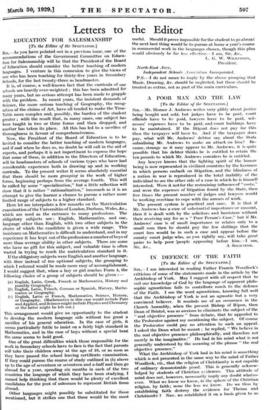Letters to the Editor
EDUCATION FOR SALESMANSHIP
[To the Editor of the SPECTATOR.]
sut,—As you have pointed out in a previous issue, one of the recommendations of the Government Committee on Educa- tion for Salesmanship will be that the President of the Board of Education should consider the better teaching of modern languages. I venture in this connexion to give the views of one who has been teaching for thirty-five years in Secondary Schools, for the last twenty-three as headmaster.
It is, of course, a well-known fact that the curricula of our schools are heavily over-weighted ; this has been admitted for many years, but no serious attempt has been made to grapple with the problem. In recent years, the insistent demands of Science, the more serious teaching of Geography, the recog- nition of the claims of Art, have all tended to make the Time- Table more complex and, possibly, the burden of the student greater ; with the result that, in many cases, one subject has been taught in two or three forms and then dropped, and another has taken its place. All this has led to a sacrifice of thoroughness in favour of comprehensiveness.
Now,. the President of the Board of Education is to be invited to consider the better teaching of modern languages, and if and when he does so, no doubt he will call in the aid of experts, and perhaps it is not impertinent to express the hope that some of these, in addition to the Directors of Education, will be headmasters of schools of various types who have bad considerable experience both in drawing up and in working curricula. To the present writer it seems absolutely essential that there should be more grouping in the work of higher forms, beginning perhaps from the average fourth. This will be called by some " specialization," but a little reflection will show that it is rather " rationalization," inasmuch as it is an attempt to give the learner a chance to pursue a rather more limited range of subjects to a higher standard.
Here let me interpolate a few remarks on the Matriculation examination of the Universities of London, Durham, Wales, &c., which are used as the entrance to many professions. The obligatory subjects are : English, Mathematics, and one, language other than English, with two other subjects in the choice of which the candidate is given a wide range. This insistence on Mathematics is difficult to understand, and in my experience it has kept out of the professions a number of boys of more than average ability in other subjects. There are some who have no gift for this subject, and valuable time is often wasted in trying to reach the matriculation standard in it.
lithe obligatory subjects were English and another language, with three instead of two optional subjects, the grouping to which I referred would be made more easy of accomplishment, I would suggest that, when a boy or girl reaches Form 4, the following choice of a group of subjects should be given :—
(a) English, Latin, Greek, French or Mathematics, History and possibly Geography.
(b) English, Latin, French, German or Spanish, History, Mathe- matics or Geography.
(c) English, Latin or French, Mathematics, Science, History, or Geography. (Mathematics in this case would include Pure and Applied, and Science might include Physics and Chemistry or the latter might be left out.)
This arrangement would give an opportunity to the student to develop the modern language side without too great a sacrifice of his general education. In the case of girls, it seems particularly futile to insist on a fairly high standard in Mathematics, and in the case of boys without a special bent the same seems to hold good.
One of the great difficulties which those responsible for the work in Secondary schools have to face is the fact that parents will take their children away at the age of 16, or as soon as they have passed the school leaving certificate examination. If they could pursue the course of study outlined in (b) above up to the age of seventeen or seventeen and a-half and then go abroad for a year, spending six months in each of the two countries the language of which they have been studying, I cannot help thinking that there would be plenty. of excellent
candidates for the post of salesman to represent British firms abroad.
Other languages might possibly be substituted for those mentioned, but it strikes one that these would be the most
useful. Should it prove impossible for the student to go abroad the next best thing would be to pursue at home a year's course in commercial work in the languages chosen, though this plan would obviously be far less effective.—I am, Sir, die.,
L. G. W. WILKINSON,
President.
North-East Area, Independent Schools Association Incorporated.
P.S.—I do not mean to imply by the above grouping that Music, Drawing, &e. should be neglected, but these should be treated as extras, not as part of the main curriculum.


















































 Previous page
Previous page